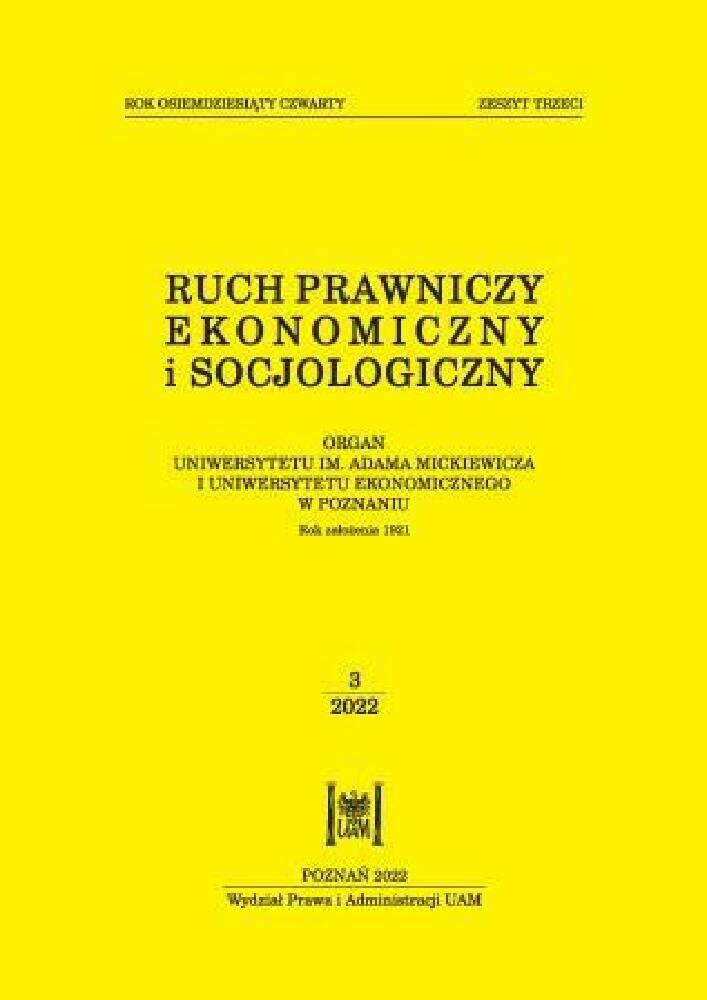Abstract
In 2018, there was a reform of higher education in Poland. One of the effects of this reform was the modification of the requirements for awarding the degree of habilitated doctor (doktor habilitowany). The article aims to answer the question of what specific conditions must be met in order to obtain a postdoctoral degree under the current law. The article fills a gap in the science of law, since no comprehensive study has been devoted to this topic. The author presents conclusions based on an analysis of the legal status, and of the views expressed in the science of law and in judicial decisions. Consideration is also given to the purposes of the reform related to habilitation, and those included in the justification to the draft Act on Higher Education and Science, as well as the clarification of the requirements indicated by the Council for Scientific Excellence – the assembly and public administration body supervising the awarding of habilitation in Poland. In the analyses, the author used the dogmatic-legal method, the hermeneutic method, and the argumentative method. In the conclusion, the specific prerequisites that must be met in order to obtain a postdoctoral degree under the current law are indicated, namely: possession of a doctoral degree in science, possession of a scientific or artistic achievement that represents a significant contribution to the development of a specific discipline, and the demonstration of significant scientific or artistic activity carried out in more than one university, scientific institution or cultural institution, especially outside of Poland. In addition to the specific prerequisites, it is necessary to bear in mind the need to meet the general prerequisites, which are beyond the scope of this study.
References
Grzebyk, P. (2022). Warunki uzyskania stopnia doktora habilitowanego w dyscyplinie nauki prawne. Państwo i Prawo 77(5): 68–87.
Izdebski, H., Zieliński, J.M. (2015). Ustawa o stopniach naukowych i tytule naukowym. Komentarz. Warszawa.
Izdebski, H. (2019). Komentarz do art. 219, [w:] H. Izdebski, J. M. Zieliński (red.), Prawo o szkolnictwie wyższym i nauce. Komentarz. Warszawa: 348–352.
Izdebski, H. (2018). Ile jest nauki w nauce. Warszawa.
Jędrzejewski, T. (2019). Komentarz do art. 219, [w:] J. Woźnicki (red.), Prawo o szkolnictwie wyższym i nauce. Komentarz. Warszawa: 573–575.
Kała, D. (2021). Ogólne przesłanki nadania stopnia doktora habilitowanego. Ruch Prawniczy, Ekonomiczny i Socjologiczny 83(1): 229–242.
Kierznowski, Ł. (2021). Stopnie naukowe i stopnie w zakresie sztuki. Komentarz. Warszawa.
Kmieciak, Z., Wegner, J. (2021). Odpowiednie stosowanie przepisów kodeksu postępowania administracyjnego w sprawach nadawania stopni naukowych i tytułu profesora. Państwo i Prawo 76(3): 3–21.
Kulczycki, E. (2020a). Monografia i arkusz wydawniczy – definicje i patologie. <http://ekulczycki.pl/warsztat_badacza/monografia-i-arkusz-wydawniczy-%E2%80%93-definicje-i-patologie/> [dostęp: 13.11.2020].
Kulczycki, E. (2020b). Jak obliczyć liczbę arkuszy wydawniczych. <http://ekulczycki.pl/warsztat_badacza/jak-obliczyc-liczbe-arkuszy-wydawniczych/> [dostęp: 26.11.2020].
Kulczycki, E. (2021). Definicja artykułu naukowego – będą problemy. <http://ekulczycki.pl/warsztat_badacza/definicja-artykulu-naukowego-beda-problemy/> [dostęp: 14.01.2021].
Pyter, M. (2021). Komentarz do art. 219, [w:] A. Balicki, M. Pyter, B. Zięba (red.), Prawo o szkolnictwie wyższym i nauce. Komentarz. Warszawa: Legalis.
Radajewski, M. (2020). Nadawanie stopnia doktora habilitowanego w świetle prawa o szkolnictwie wyższym i nauce. Studia Prawno-Ekonomiczne 114: 81–88.
Stec, P. (2021). Nowe ścieżki kariery akademickiej – habilitacja 2.0. Państwo i Prawo 76(7): 3–18.
Szydło, M. (2022). Pojęcie nauki i osiągnięć naukowych w postępowaniach awansowych w nauce (uwagi z perspektywy nauk prawnych). Państwo i Prawo 77(5): 52–67.
Ślebzak, K. (2013). Jednotematyczny cykl publikacji jako przesłanka nadawania stopnia doktora habilitowanego nauk prawnych. Państwo i Prawo 68(7): 31–40.
Ślebzak, K. (2020a). Komentarz do art. 219, [w:] K. Baran (red.), Akademickie prawo zatrudnienia. Komentarz. Warszawa: 392–400.
Ślebzak, K. (2020b). Przesłanki nadawania stopnia doktora, doktora habilitowanego oraz tytułu profesora a model awansów naukowych w świetle ustawy Prawo o szkolnictwie wyższym i nauce. Nauka 2: 61–85.
Śliwerski, B. (2017). Czy ma sens pisanie i publikowanie recenzji rozpraw naukowych w czasopismach. <https://sliwerski-pedagog.blogspot.com/2017/05/czy-ma-sens-pisanie-i-publikowanie.html> [dostęp: 18.01.2021].
Węgrzyn, G. (2020). Czas odsłania wady przepisów. Forum Akademickie 6: 8–9.
Wojtuń, M. (2021). Sprawiedliwość proceduralna w postępowaniach awansowych. Państwo i Prawo 76(2): 3–17.
License
Copyright (c) 2022 WPiA UAM

This work is licensed under a Creative Commons Attribution-NonCommercial-NoDerivatives 4.0 International License.





